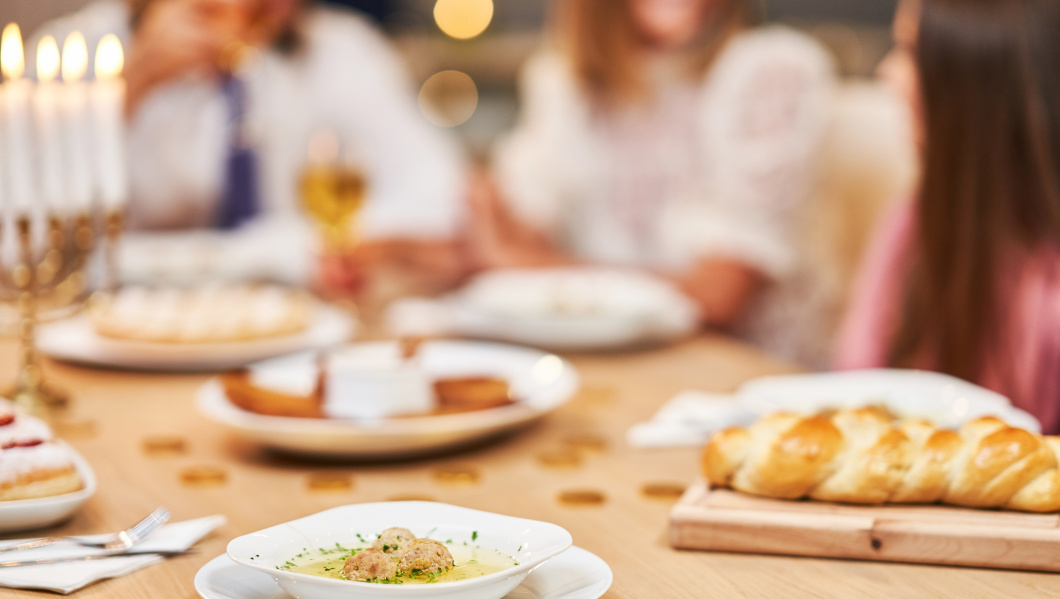How to Talk to Your Kids About Different Holiday Traditions

When I was a kid, everything from the end of November to the end of December was Christmas. TV was full of Christmas movies and episodes of my favorite shows. We had Christmas parties at school, at church, at gymnastics. It was magical! But it was very narrow.
Christmas, or the overly-secularized, gift-centric holiday that it often is, was the only story in my small southern town. But as I’ve grown, and the world has become increasingly aware and connected, Christmas has given way to the “holidays,” and every day it seems I learn something new about a new tradition, or holiday, or cultural experience. To be clear, I don’t think this is a bad thing. I think it’s wonderful, and I love that my kids are growing up, in the same small southern town, learning about people and places and holidays from all over the world.
But as kids, they have questions, about why some people do things differently than we do. These questions arise when we eat different food at lunch, or we drive different cars, our we go to a rocky beach in New England every summer instead of the white sandy gulf. And those differences are often especially noticeable during times like the holidays, which are deeply embedded with familial, religious, and cultural traditions.
At the holidays, your kids may see other Christians celebrating differently. Some families have Advent wreaths, and some celebrate St. Nicholas day. Some families open presents every night of Christmastide, then burn their Christmas tree on Epiphany. Some take communion on Christmas Eve, and some go to a midnight mass as the clock strikes 12.
Your kids may learn about all kinds of different celebrations at school, on TV, or from their friends. The winter holidays include the Jewish festival of Hanukkah, St. Lucia Day, Three Kings Day, Chinese New Year, Kwanzaa, Mawlid el-Nabi, Watch Night, and more. So how do you talk to your kids about friends who may observe different holiday traditions? Start with these ideas but most of all, ask God to show you how to navigate these important conversations.
How to Talk to Your Kids About Different Holiday Traditions
1. Learn together.
If you see or hear something about a tradition you aren’t familiar with, spend some time researching it as a family! The Internet is your friend here, but so is your local library. Can you find a children’s book about the tradition? Check it out and read it together. Try to find shows or kid-friendly movies (or videos on the Internet) showing different traditions. Then talk about them as a family. Ask questions like, How do they celebrate Christmas differently? What holiday do they celebrate that we don’t? What do you think looks fun or interesting about that tradition?
2. Acknowledge and appreciate without appropriating.
Acknowledging and appreciating someone else’s cultural or religious tradition is one thing, but appropriating it is never okay. Do the hard work of learning about a tradition, element, or meal, but be careful if you start incorporating it into your own traditions. Are you doing it because it’s cool or fun, or for that social media picture? If so, step back. Ask yourself questions like: How would you feel if someone took a sacred part of Christmas and used it for their own image? Are your actions respectful of the tradition and the people who celebrate it? If someone from that tradition were present with you, how would they feel?
3. Find common ground in giving.
While not universally true, many winter holidays and traditions (regardless of religion or culture) focus on giving. And giving is a universally good idea! Find common ground as you read and learn about different holidays. Hanukkah, Christmas, Kwanzaa, Chinese New Year, and Three Kings Day all have a gift-giving component to their celebrations. Talk to your kids about the importance of giving, and how all these traditions share that idea. Brainstorm ways you could get together with friends of all traditions and give back to your community or those in need. Even when celebrations and traditions are different, giving is a way to bring everyone together.
So as December draws near and opportunities arise for conversations about different Christmas traditions and traditions that belong to different religions and cultures, spend some time learning with your kids. The holidays are a wonderful time of year to learn together!